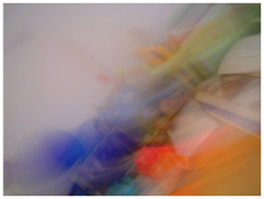MONTHLY BLOG 11, WHERE IS THE POLITICAL LEFT TODAY?
If citing, please kindly acknowledge copyright © Penelope J. Corfield (2011)
WHERE IS THE POLITICAL LEFT TODAY?1

2
Today’s political scene is a blurred rainbow. Gone are the old simplicities – if they were ever that simple – when one reactionary party of tradition and privilege (the Right) was confronted by one progressive party of reform and egalitarianism (the Left).
A heartfelt cry for ‘social justice’ still has resonance. But how does that translate into politics, as opposed to single-issue campaigning? It’s always easier to know what is not wanted than to know what to put in its place. And even harder to know how to achieve the alternative.
Claims for progressive thought today are found in the Green Party, generating red-greenery. Ditto among some Liberal Democrats, whose social democratic component came from Labour: the result, red-orange (alongside orange-blue). Some Tories also use community-based language, as in the red-blue thought of Phillip Blond.3 And campaigners within Labour today advocate a return to localism and mutualism:4 a blue-red vision.
That latter position recalls Christopher Logue’s 1966 poem, with its only partly tongue-in-cheek conclusion: ‘I shall vote labour because/ deep in my heart/ I am a conservative’.5
So what now? Of course, there are other possibilities for direct action outside the conventional political parties, such as via the Transition Network.6 But we can all rethink. For Labour activists, some of the big questions relate to its underlying political philosophy.
One issue is Labour’s attitude to the state, and specifically to central government. Although part of the movement historically sprang from local unions, cooperatives and mutuals, there has also been throughout the twentieth century a push towards centralisation. (The same pressures also operated upon the Conservative party in power). Control of the levers of central government seems necessary as a means of introducing change.
On the other hand, centralised control, introduced to remedy injustices, can work against itself, as novelists like George Orwell and Arthur Koestler have urgently warned.7 Excess centralisation risks cutting national politicians off from their roots. And, even more importantly, it risks alienating the masses, to and for whom policies are enacted at a distance.
Furthermore, in a development that is post-Orwellian but often carries Orwellian connotations, the growth of an adjunct state of regulatory quangos (which has happened under both Conservatives and Labour in the later twentieth century) is also intervening extensively between the state and its citizens.8 This development also risks introducing another source of political alienation at many levels in society and of diminished social trust.
Consequently, how to recombine the local and the central is one resonant question for today – a question which does not require yet another ‘top-down’ answer.
A second question asks not just about the mechanisms for promoting change but about the presumed beneficiaries. Who are the underdogs in society today whose cause(s) should be prioritised by progressive politics? Without a realistic set of answers, national politicians end up inventing policies in the name of abstractions (‘choice’ ‘competition’) – and often contradicting themselves, as one hand undoes what the other hand achieves.
In fact, there is not one universal victim whose wrongs stand proxy for all others. Complex urban/industrial societies generate very complex social relationships. There are divisions and conflicts at all levels, as well as cooperation and solidarity. One person’s underdog might be another person’s oppressor. An exploited and impoverished husband might beat his wife and children. A subjugated wife might submit her daughters to genital circumcision.
Divisive issues are often triggered by religion; ethnicity; immigration; gender relations; age; and lifestyles. Economic conflicts may also arise between different groups among the working class, as the trade union movement is well aware. Well-paid ‘labour aristocrats’ may not feel solidarity with the low-paid. The poor in employment may resent the unemployed poor. And vice versa. The unemployed may resent those in employment – and be divided
What is to be done? Again, the answers need realistic debates. Not just top-down pronouncements. Not just competitions to discover who is the ‘most victimised’. Novels and especially plays, with multiple voices in a compressed scenario, are good vehicles to explore these themes. But either way, progressive change and social cooperation will require good local governance (not another top-down reorganisation) as well as the contribution of the central state. To repeat: Social justice is not just one THING. It’s a process.
1 With thanks to all those who attended the Battersea Labour Party’s reading-group on Wednesday 19 July 2011 for a vigorous debate on this question; and to Tony Belton for a robustly critical reading of my first draft.
2 Blurred Rainbow 2 by Amazing-Love: from amazing-love.deviantart.com (downloaded 30 July 2011).
3 See Phillip Blond, Red Toryism (2010).
4 See Maurice Glasman, Jonathan Rutherford, Marc Stears and Stuart White (eds), The Labour Tradition and the Politics of Paradox: The Oxford/London Seminars, 2010/11 (2011).
5 Christopher Logue, ‘I Shall Vote Labour Because …’ (1966).
6 This network ‘supports community-led responses to climate change and shrinking supplies of cheap energy, building resilience and happiness’: see www.transition.network.org.
7 See esp. George Orwell, Nineteen-Eighty-Four (1948); Arthur Koestler, Darkness at Noon (1940).
8 For a helpful overview, see Carsten Greve, Matthew Flinders, and Sandra Van Thiel, ‘Quangos – What’s in a Name? Defining Quangos from a Comparative Perspective’, Governance, 12 (1999), pp. 129–46.
For further discussion, see Twitter
To read other discussion-points, please click here
To download Monthly Blog 11 please click here

